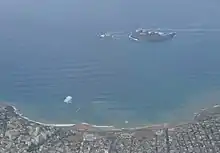Îles de la Madeleine (Senegal)
The Îles de la Madeleine [il də la ma.dlɛn] lie west of Dakar in Senegal. The islands are uninhabited. The main island is Sarpan, known for its Stone Age tool finds. The islands are also known for their birds, fish and plant life. The cliffs are steep, and had been carved by the sea over millions of years. Îles de la Madeleine National Park (French: Parc national des Îles de la Madeleine) is one of the smallest national parks in the world.[1]

Îles de la Madeleine National Park

At just 0.45 km2 (110 acres),[2] Le Parc National des Îles de la Madeleine is the smallest national park in the world, and a UNESCO World Heritage Tentative List site. Sarpan (Île aux Serpents), the largest of the islands, is home to breeding colonies of red-billed tropicbird, white-breasted cormorant, and bridled tern.
Tree
When French naturalist Michel Adanson explored the islands in 1749, he claimed to have found a baobab that was 3.8 metres (12 ft) in diameter, which bore the carvings of passing mariners on its trunk, including those of Prince Henry the Navigator in 1444 and André Thevet in 1555.[3] From this he concluded that the species was extraordinarily long-lived. When Théodore Monod searched the island in the 20th century, this tree was not to be found.
See also
References
- Magdalen Islands (Iles de la Madeleine) in Senegal, Protected Planet
- Magdalen Islands (Iles de la Madeleine) in Senegal, Protected Planet
- Wickens, Gerald E.; Lowe, Pat (2008). The baobabs pachycauls of Africa, Madagascar and Australia. New York: Springer Science + Business Media, B.V. pp. 31–. ISBN 9781402064319.